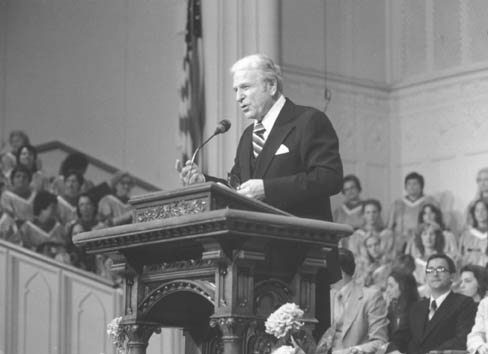Founding and Development
 On October 5, 1969, his twenty-fifth anniversary as the pastor of First Baptist Dallas, Dr. W.A. Criswell presented to the church his vision for an institute that would provide biblical teaching for lay people that would be both intellectually and spiritually sound. The church enthusiastically approved the recommendation on October 7, 1970, and began developing the curriculum that would reflect the nature of the lifelong ministry of W.A. Criswell: teaching centered on the Bible, with an evangelical theology and evangelistic passion.
On October 5, 1969, his twenty-fifth anniversary as the pastor of First Baptist Dallas, Dr. W.A. Criswell presented to the church his vision for an institute that would provide biblical teaching for lay people that would be both intellectually and spiritually sound. The church enthusiastically approved the recommendation on October 7, 1970, and began developing the curriculum that would reflect the nature of the lifelong ministry of W.A. Criswell: teaching centered on the Bible, with an evangelical theology and evangelistic passion.
Classes began on January 12, 1971, with two certificate programs consisting of twelve semester hours of study in theology and the Old and New Testaments. On the first night, 329 students enrolled. For the next two years the institute operated as a night school, providing working lay people with an education previously unavailable to them at a convenient time.
By 1973 a three-year diploma program had been established, and by 1977 both a bachelor’s and master’s program were instituted. The American Association of Bible Colleges (AABC) accredited the undergraduate programs in 1979, and in 1985 the Southern Association of Colleges and Schools (SACS) accredited all programs of study. At that time the name of the institute changed to Criswell College. Since its founding, the institute had been housed in the facilities of First Baptist Church, but in 1989 prayers for a dedicated campus were answered and the Gaston Avenue property was acquired. The property was remodeled and in January 1991, the College moved onto its own campus just minutes from Downtown Dallas.
Since that time the College has created and maintained a governing board independent from First Baptist Church Dallas, and developed other undergraduate and graduate programs, diversifying its curriculum to include various majors in addition to the biblical studies major. The College has also established several online graduate degree programs. Beginning fall 2020, each entering freshman who graduates from Criswell does so with a double major (Bible & Theology and another of their choosing), equipping them to influence the culture for Christ in whichever field they pursue.
Although the organization has developed from an institute for lay people to an accredited college, its distinctives have not changed: an uncompromising commitment to the inerrancy of Scripture, expository preaching, the study of biblical languages, personal evangelism, international missions, and hands-on practical ministry training.
Historical Timeline
1970 W.A. Criswell and First Baptist Church Dallas found Criswell Bible Institute
1971 Evening classes begin with 329 students
1972 Dr. H. Leo Eddleman becomes the first full-time President and Dr. Criswell is named Chancellor
1973 Day classes begin
1974 Three-year diploma program initiated
1975 Dr. Paige Patterson becomes President
1975 Bachelor’s program introduced
1977 Criswell Graduate School of the Bible opens
1979 Undergraduate programs accredited by the American Association of Bible Colleges (AABC)
1985 All programs accredited by Southern Association of Colleges and Schools (SACS)
1985 Criswell Bible Institute becomes Criswell College
1991 Criswell College moves to its Gaston Avenue campus
1992 Dr. Richard Melick, Jr. becomes President
1996 Dr. C. Richard Wells becomes President
2001 Criswell College becomes affiliated with the Southern Baptists of Texas Convention (SBTC)
2002 Founder and Chancellor, W.A. Criswell, laid to rest
2003 Dr. Jerry A. Johnson becomes President
2010 Criswell College creates a new governing board
2010 Dr. Jerry A. Johnson returns as President
2014 Dr. Barry Creamer becomes President
2020 Entering freshmen who go on to graduate will do so with a double major — Bible & Theology and another of their choosing
2021 Mary L.A. Stanton & Lance Ouellette Hall opens its doors to residents

